GOING LOKUM
A Turkish outpost of delight in Stellenbosch
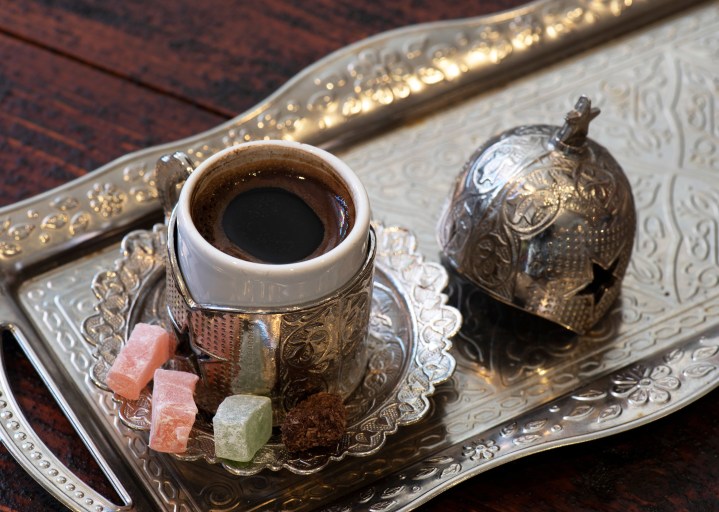
Of all the tasting experiences you’d expect to find in Stellenbosch, Turkish Delight and Turkish coffee is probably not one of them. But Dilek Aktan of TurkSpirit brings an authentic taste of her home country to a hidden café off Plein Street.
It’s called lokum in Turkey. The story goes that an intrepid 19th century traveller to Istanbul took the sweet confection home to Britain, but couldn’t remember the proper name for it and so, not very imaginatively, dubbed it Turkish Delight. It’s gone by that name ever since in the English language, too often referring to an over-sweet, mouth-cloying and palate-sticking sugar-fest scented overpoweringly with rose, that bears little resemblance to the real fresh deal. Fry’s Turkish Delight, I’m looking at you.
I had a first taste of TurkSpirit’s authentic lokum recently and it was a revelation in flavour and texture, so much more interesting than my childhood experiences of the sweet in 70s England.
The only time we had Turkish Delight was at Christmas, when it was an essential part of the extravagant array of what our family called dessert, laid on only at that time of year. Pudding was pudding, the word “dessert” was reserved for what followed. Once the Christmas pudding and brandy butter, jelly and cream had been cleared away, amid the detritus of Christmas crackers, bad jokes and paper hats, various boxes and pretty glass bowls took over the centre of the table for desultory nibbling by the adults with coffee or, in the children’s case, enthusiastic samplings of pure greed.
Dates in a long box with rounded ends and a plastic imitation stalk for pricking them out of the box; still soft and chewy dried figs; jewel-like crystallised fruits, their centre a liquid dash of syrup that inevitably dribbled down your chin; a big bowl of nuts in their shells – Brazils, walnuts, hazelnuts and almonds – to be attacked noisily with the nutcrackers, littering table and floor with shards of shell; Turkish Delight exotically scented with rose in a round balsa wood box which opened with a puff of powdered sugar. There were chocolates of course, whatever had been received as gifts: truffles, liqueur chocolates, Dairy Milk Tray, Quality Street and sophisticated Bendicks Bittermints. This cornucopia is what comes to mind whenever I encounter the word “sweetmeats” – that sense of over-the-top sugar heaven. The collection would stay on the sideboard over the whole Christmas period until, by about February, the last cubes of Turkish Delight and the last sticky date were gone and it was over until next year.
That intense sweetness is what I imagined in The Lion, the Witch and the Wardrobe when Edmund asked the White Witch for Turkish Delight – it wouldn’t have been my choice then or now.
But when I tasted Turkish Delight again recently at the fynbos tasting for my last TGIFood article, paired with fynbos-infused alcohols, it was a whole new experience – the cubes weren’t dredged in sugar, they were sweet but not too sweet, flavoured with things other than rose, and delightfully chewy without stickiness. I decided to track it to its source.
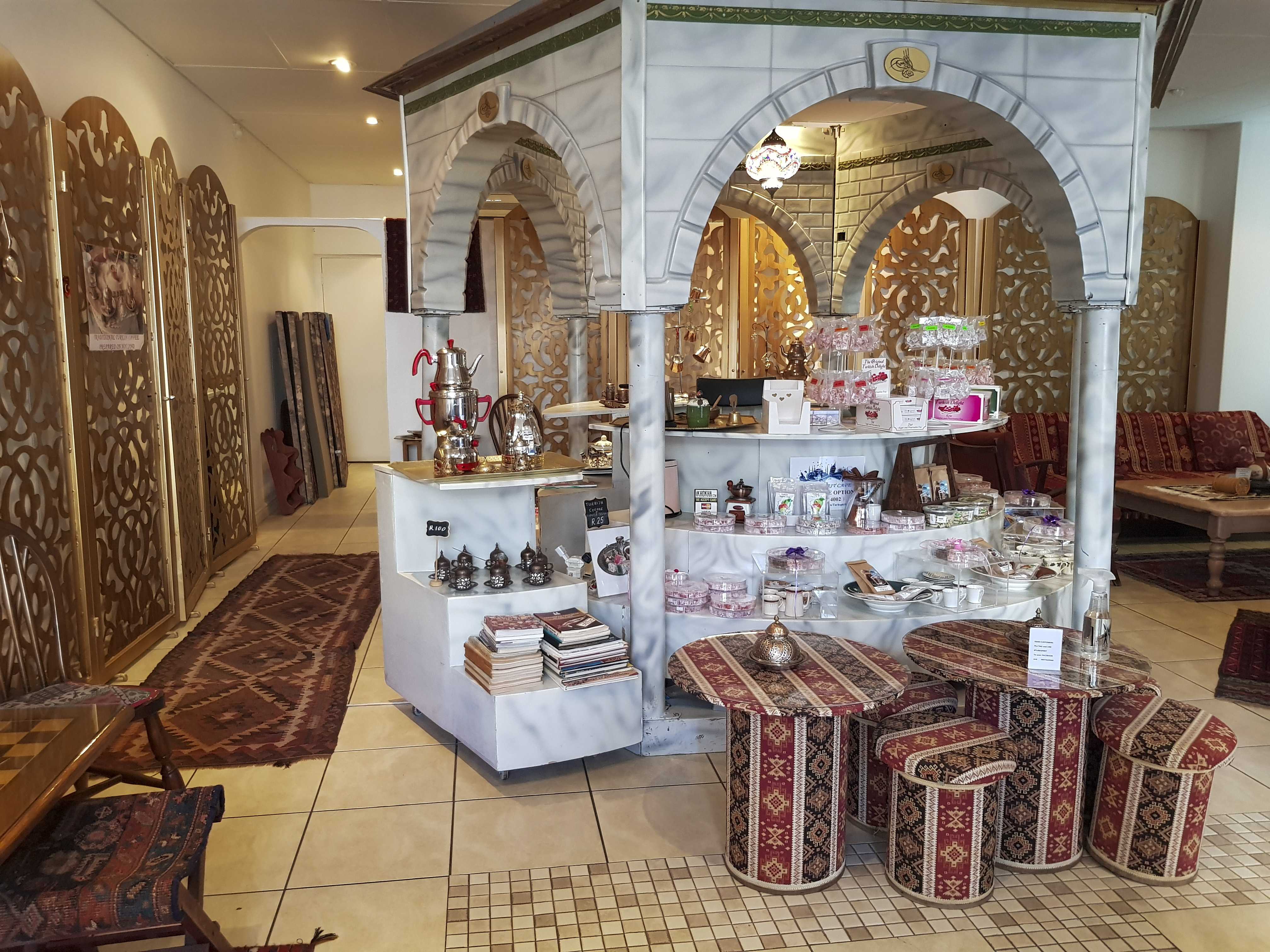
TurkSpirit Café is an outpost of Turkey in Stellenbosch. (Photo: Patrick Heathcock)
The feeling of walking into another culture is strong as you step over the threshold at TurkSpirit’s café in Stellenbosch. An elaborate faux-marble arched pavilion encloses the serving area, piled high with packages of confectionery, copper pots and coffee paraphernalia. Low tables with cushioned benches, stools and chairs, or floor cushions around even lower tables, fill the rest of the space, rich carpets and throws in deep colours, lots of copper and brass, fretwork screens and background Turkish music. Piles of board games indicate that you’re welcome to linger. It’s a busy Saturday morning (the café is open only on weekends) and owner, Dilek Aktan, is brewing coffee the Turkish way.
The café is a weekend showcase for TurkSpirit’s main business, manufacturing Turkish Delight, which Dilek has been doing in Durbanville for the last 17 years. “A couple of years ago I decided to open this coffee shop so people can sit and enjoy Turkish-type coffee, experience a bit of Turkish culture and feel like they are in Turkey,” she says.
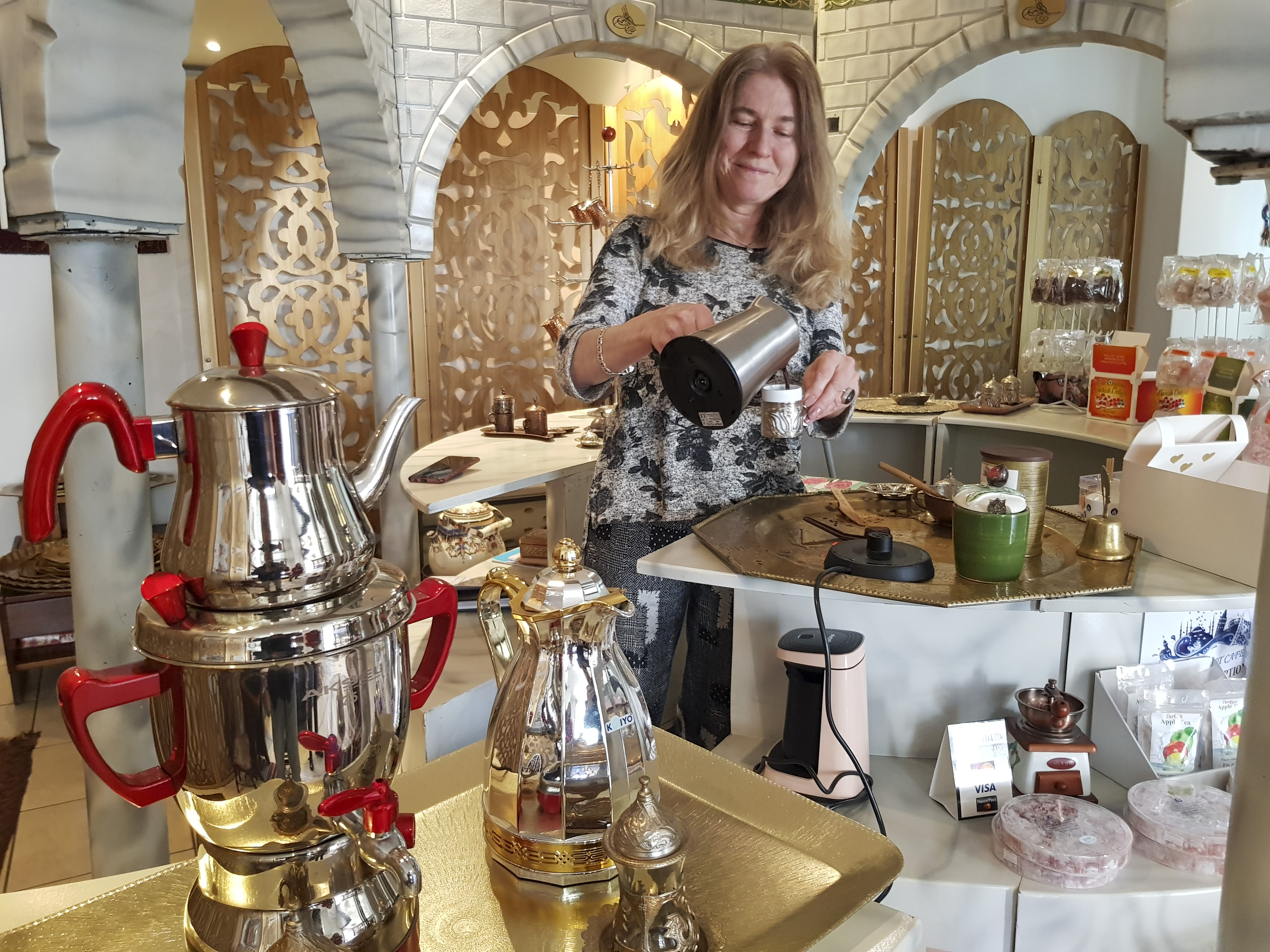
Dilek Aktan brews coffee in an electric Turkish version of the traditional copper cezve with a side spout and long handle. (Photo: Patrick Heathcock)
Dilek first came to South Africa in 2000 running an import business. “Then I see people selling Turkish Delight, but it’s not real Turkish Delight. I say, I’m Turkish, so we started making a little bit the genuine way and people like it, and we made it into a business after that.” The fake product that she is so dismissive of uses gelatine to set it and she says is really just jelly sweets. Authentic lokum uses only cornstarch and sugar, with fresh juices, ingredients and essences to flavour it, a two-day process. “We use the old Ottoman recipe. We cook it in a copper bowl – four hours cooking, one night rest and the next day we cut and pack.”
Dilek emphasises that making Turkish Delight isn’t something you can do in a home kitchen. She’s a chemical engineer by training and took two years to develop the recipe and master the processes of making an authentic Turkish product with exactly the right texture. She is proud of making it in small-scale quantities so that she can retain genuine high-quality ingredients – real sugar not corn syrup, fresh locally-sourced fruit juices and essences for the flavourings (apart from the rose essence which she has to bring in from Turkey). Even so each batch is 50kg and she makes 500kg a week, in several different flavours and styles, at her Durbanville factory.
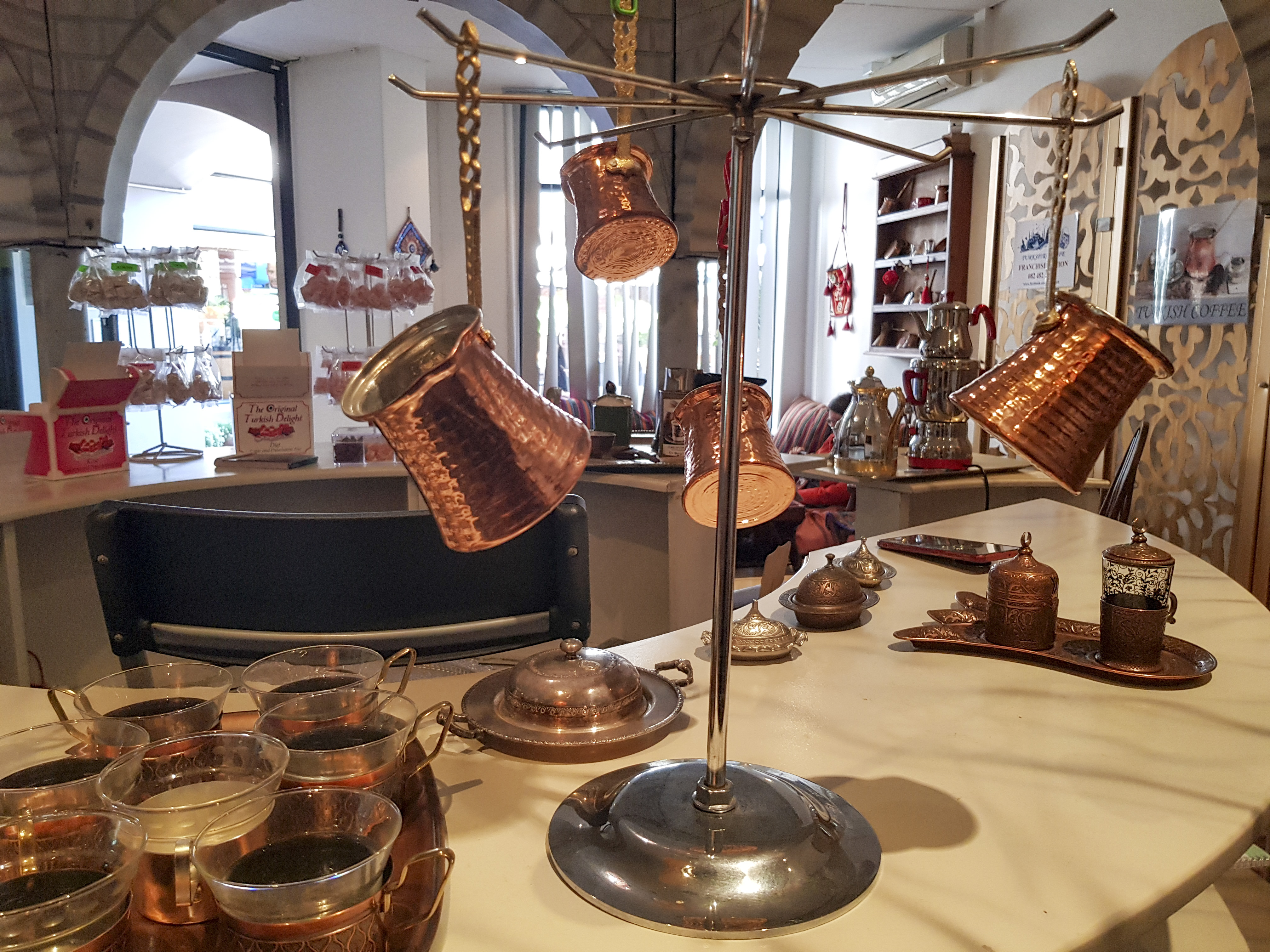
The traditional copper cezve is still used to make Turkish coffee on the stove top or in a tray of hot sand for the required slow brewing. (Photo: Patrick Heathcock)
“Turkish Delight is very creative so you can develop as much as you want. In my country we have more than a hundred different varieties, different shapes and colours, different flavours.”
Today we’re going to be tasting seven flavours, but first Dilek asks how we like our coffee – sweet or unsweetened. Turkish coffee is made by the individual cup with the sugar already in it and you order it to taste. I’m not normally a coffee drinker so she suggests I try her Mira coffee – creamy with all sorts of spices and flavourings.
Turkish coffee is made completely differently to the high-pressure Italian style we’re familiar with. It’s very finely ground, brewed long and slow until it froths up. This derives from the traditional Ottoman pre-mechanisation method of making it in a cezve (pronounced jezve), a long-handled copper pot that goes straight on the stovetop or fire.
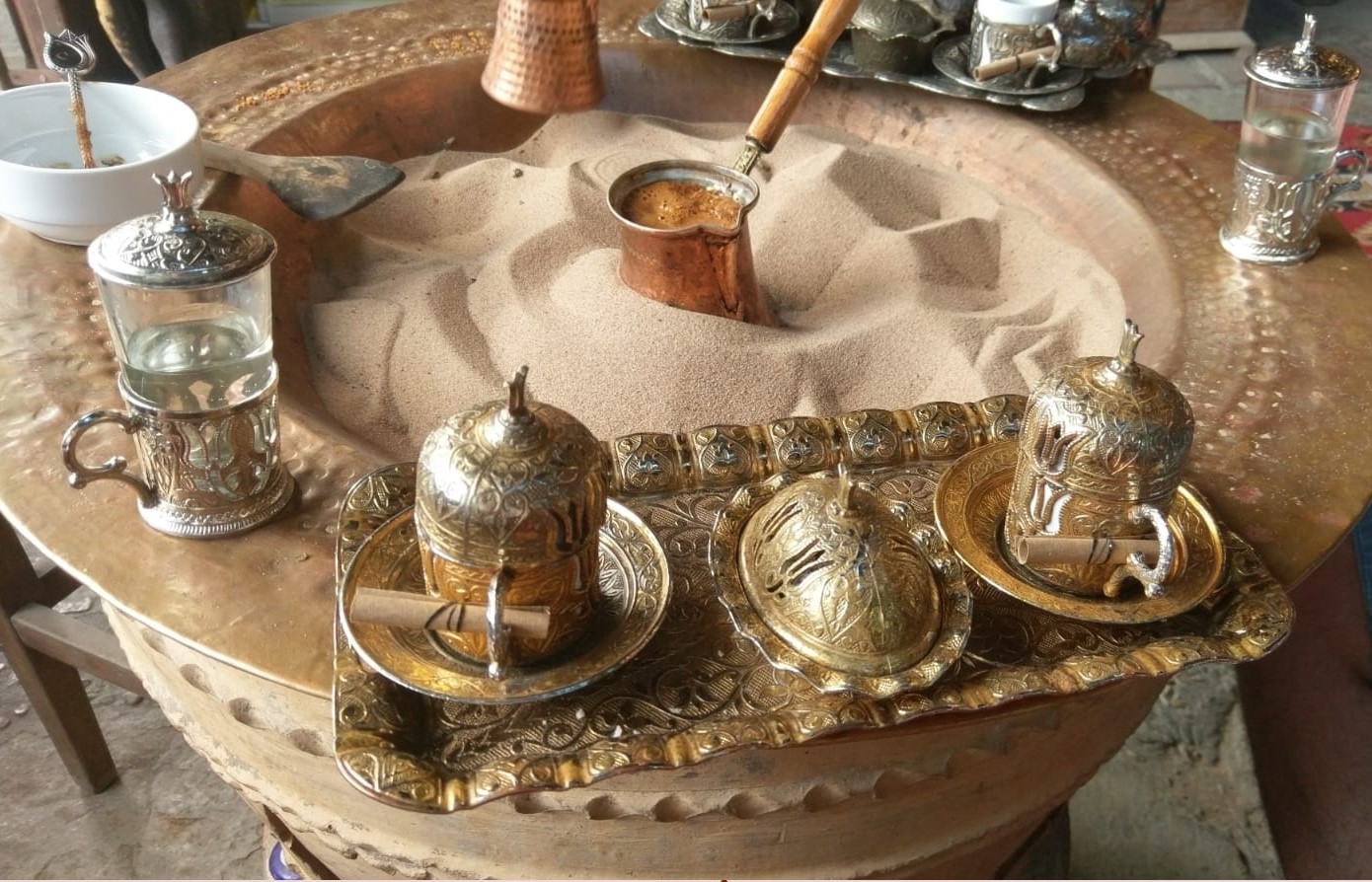
Brewing coffee the old-school way in a bowl of hot sand. (Photo: Supplied)
Dilek showed us pictures of making “sand coffee”, the old school way, which is something you can learn how to do here at the café if you book ahead. A wide shallow bowl is filled with sand, heated up – in the old days over a fire, here and now by electricity. “You can do this at a braai,” she says. The coffee and water are measured into the cezve, just enough for one or two small cups, which is sunk into the hot sand and slowly moved around for even heating. This brews the coffee gently until it froths up and is ready to pour.
Today Dilek is short-staffed and uses the modern equivalent of a cezve – an open electric kettle with a side-pouring spout and long handle, which brews the coffee in similar slow-brew style.
Turkish coffee isn’t filtered or strained. “We get all the benefits of the coffee because it’s not filtered out. Slow cooked with the water and sugar, a couple of coffees a day is very healthy,” she says. She brings us a small tray with ornate little cups in filigree metal holders and domed lids. These retain the warmth while you wait a few minutes for the grounds to settle.

Our Turkish Delight tasting included seven flavours. Clockwise from left: rose, mint, orange, pomegranate, chocolate, ginger, almond. (Photo: Patrick Heathcock)
My Mira coffee is delightful. I immediately detect cardamom but there’s a lot more: Dilek mentions salep (a traditional Turkish milky drink thickened with orchid root and spiced with cinnamon), carob, mahlep (a fruity spice made from the ground kernels of Persian cherries), among other secret ingredients. It’s her own recipe, not strictly traditional but absolutely delicious. My husband has the regular black coffee – it’s smooth and not in the least bitter – the slow gentle brewing without boiling gets maximum flavour. “If it boils, that’s when it gets bitter,” Dilek says. You only ever drink the top half of the cup. Try to get one last sip and you find yourself with a gritty mouthful of fine coffee grounds. No surprises, in my enthusiasm to get one last aromatic taste, I do just that. There’s a fine art to the coffee ritual and that includes knowing when to stop.
Our Turkish Delight tasting comes in seven small bowls on a decorative brass tray with a hand-written label for each – orange, pomegranate, almond, ginger, rose, chocolate and mint.
I bite into the first piece to find it’s nothing like my memories of our Christmas dessert – for a start it’s not sickly sweet, the flavours are clear and fresh. Orange tastes like orange, the rose is deep, delicate and flowery. And the texture is chewy without being sticky or cloying. The cubes are tossed in a light coating of sugar mixed with flavourless cornflour, just enough to keep them from sticking and hardly sweet at all. We particularly enjoy the almond which is mild in flavour with chunks of nuts embedded, and the fruity pomegranate, although I keep doing the rounds of the different flavours and can’t settle on just one favourite.
I catch Dilek in between customers to ask her more about lokum in Turkey. “It’s our traditional sweet. We eat it on religious and national holidays, when guests come we serve Turkish Delight, and you can take as presents for someone. We are 99% Eastern culture in Turkey and during Eid, especially for children, there’s a custom of giving sweets and Turkish delight. Before chocolate came on to the market in small towns in Turkey the most popular sweet was Turkish delight. Children love it.”
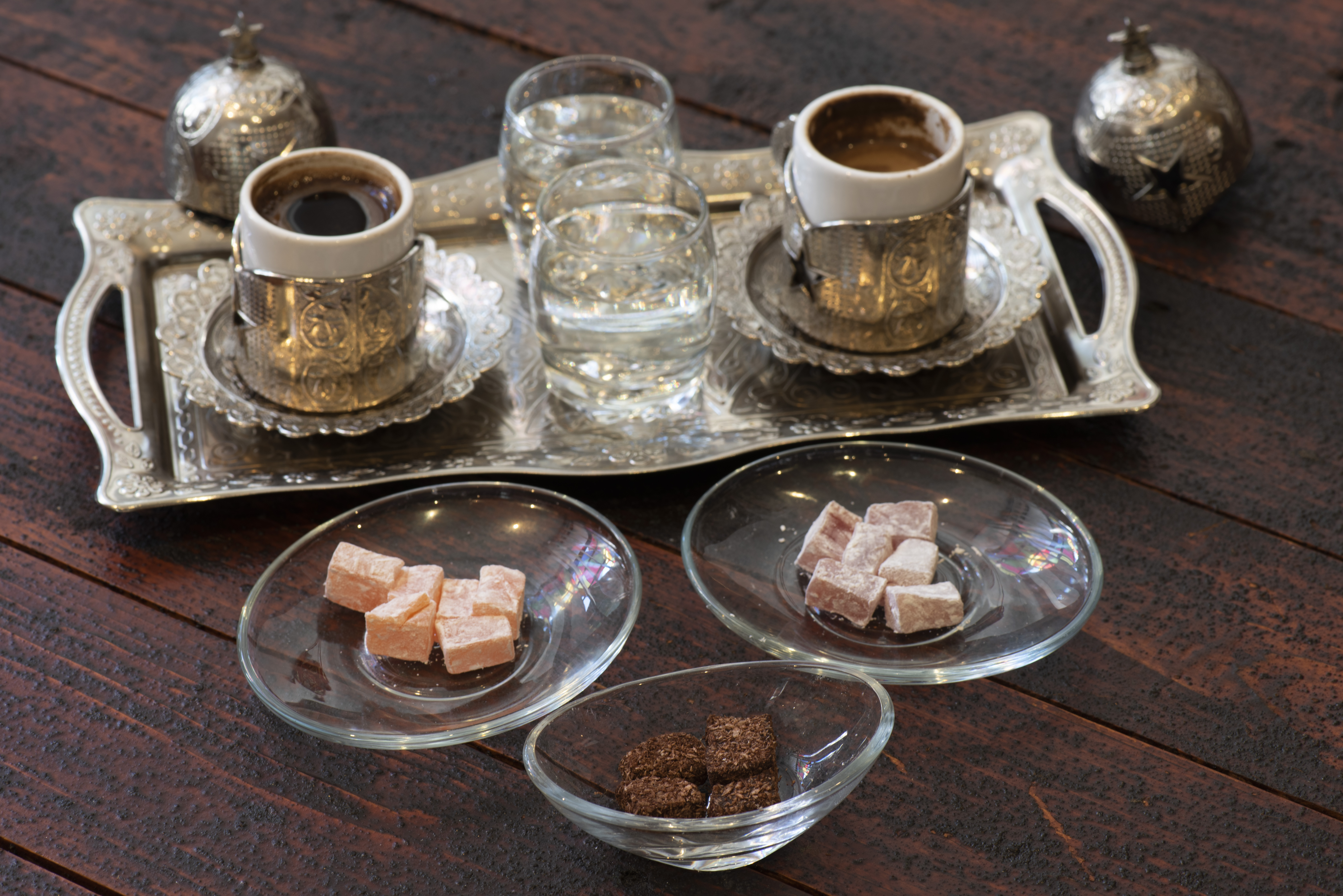
Turkish coffee is always served accompanied by glasses of water to clear the palate… and to wash away the fine coffee grounds if you take one sip too many. (Photo: Patrick Heathcock)
This brings back her childhood memories: “When I was a child and my father gave me some money, I would go to a small shop on the corner opposite our house, buy two biscuits and some Turkish Delight and we would make a sandwich with the biscuits, I loved that. It was an old tradition with all the children.”
Lokum is usually sold alongside a whole range of other traditional sweet favourites such as baklava and halwa. The full name she says is rahat lokum which means “smooth in the throat” because it’s soft. “If you don’t have teeth when you’re old you can still eat it.”
Freshness is important. Dilek says when she first arrived in South Africa the imported stuff, besides being expensive, just wasn’t fresh after a two-month journey. It loses that chewy but smooth and melt-in-the-mouth texture and becomes tough. Hers is made freshly every week, and though it lasts well she prefers to keep stocks turning over. Christmas and Eid are her busiest times – sweet treats that are vegan, halaal, and also come in a sugar-free diabetic version, are in big demand here in South Africa for feasts and celebrations, she says, and her diabetic Turkish Delight is the only one on the market.
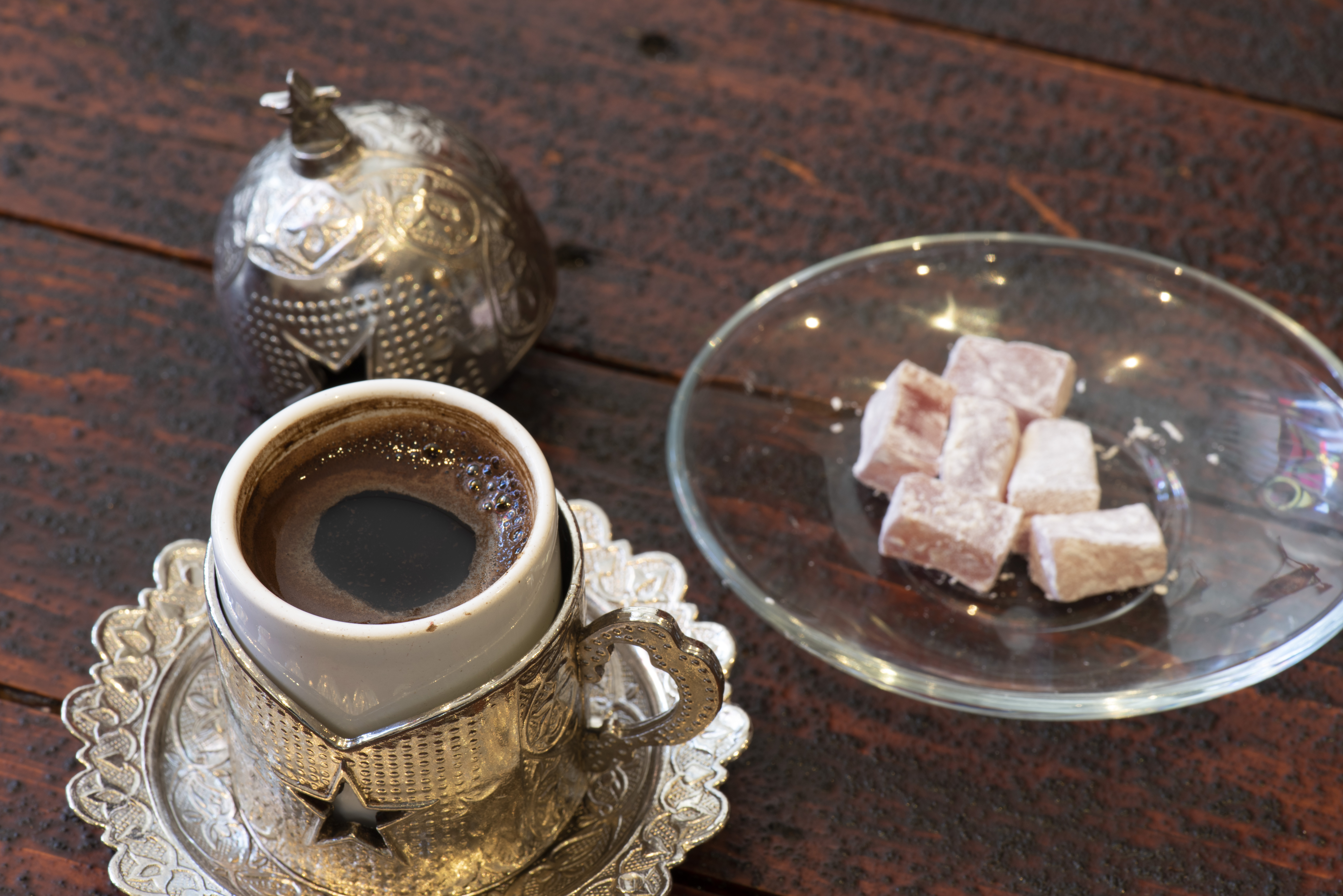
Turkish coffee and Turkish Delight are a natural pairing. (Photo: Patrick Heathcock)
I ask Dilek what she will be looking out for when she next returns to Turkey to visit her family – new flavours or ideas for new products? “More than products I look at ideas for how to serve it, for new coffee accessories. Our country is very creative – last time I was there they served it in this cup, now I’m sure they have a different style. I’ll see how they are serving in the coffee shops there and bring back the latest to use in my café.”
So if you’re in the mood for a taste of Turkey without getting on a plane, head to this quirky little café in Stellenbosch for your next coffee break or dessert. DM/TGIFood
Find out more about Turk Spirit products and café here.
Follow Kit Heathcock on Instagram @kitheathcock
The writer supports Ladles of Love, feeding the hungry in South Africa.





 Become an Insider
Become an Insider
Comments - Please login in order to comment.